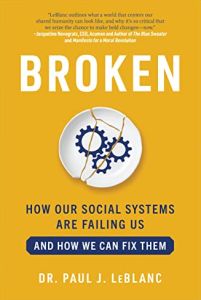Únase a getAbstract para acceder al resumen.

Únase a getAbstract para acceder al resumen.
Paul LeBlanc
Broken
How Our Social Systems Are Failing Us and How We Can Fix Them
Matt Holt Books, 2022
¿De qué se trata?
Organizations must put people at their center to meet burgeoning social problems.
Recommendation
University president Paul LeBlanc offers a sweeping yet detailed indictment of US institutional failures to meet human needs, and issues a clarion call to repurpose organizations to better serve humanity. LeBlanc outlines how to put people at the center of ailing social institutions and business models, including the creation of more co-operatives and public benefit corporations. He also advances a pioneering employment scheme to address AI disruption: a “human work initiative” to match people with human-focused work that can’t be replicated by machines.
Summary
About the Author
Paul LeBlanc is president of Southern New Hampshire University, the largest nonprofit provider of online higher education in the United States. He is a recipient of the prestigious TIAA Institute Hesburgh Award for Leadership Excellence in Higher Education and has served on the Board of the American Council on Education. LeBlanc is the author of Students First: Equity, Access and Opportunity in Higher Education.





















Comment on this summary